Watch: Who were the Vikings?
Find out more about who the Vikings were and where they came from.
Excuse me. Yes, you… would you like to learn about the Vikings? Great! Well let’s start at the beginning…The Vikings lived over 1000 years ago, but they don’t look that old to me, what’s your secret?The Vikings were Norse people who came from an area called Scandinavia. You might know it better asNorway, Sweden and Denmark.
The word Viking means ‘a pirate raid’, which is a fitting name as they were fearsome warriors and oftenraided monasteries for treasure.
But they weren’t all bad, bloodthirsty and violent - they also settled with their families and farmed the landpeacefully for many years.
I’m sorry about this… they never wore horned helmets. Let’s move on.
Did you know they were great explorers too and travelled all over the world? Vikings explored as far awayas North America. Can you believe they even travelled through Russia to trade in the Middle East.Amazing!
Ah, ‘The Thing’, an early version of today’s parliament. The Norse people met to discuss new laws andsolve arguments. They’re arguing over who owns your shoes.
Plus, we still use some of their Old Norse language today. Words like ‘egg’, ‘muck’ and ‘dirt’.
Even some modern town names are based on Viking words! York and places that end in ‘thorpe’, ‘by’ or‘kirk’. So for example, the Viking word for deer is “djúr” and village is ‘bȳ’ - together making “Derby”.
There we go - the history of the Norse people in a matter of minutes. How enjoyable was that? Fantastic!Isn’t history great? Oh, you look like you need a bath.
What were the Vikings like?
The name 'Viking' comes from a language called 'Old Norse' and means ‘a pirate raid’.
Some came to fight, but others came peacefully.
They were farmers, and kept animals and grew crops.
They were skilful at crafting, and made beautiful metalwork and wooden carvings.
Viking warriors fought using long swords and axes.
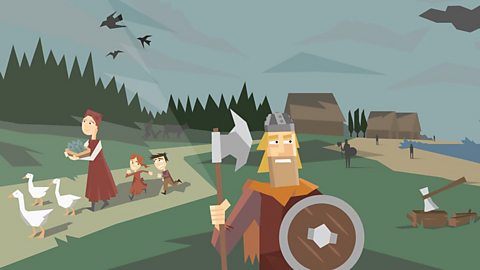
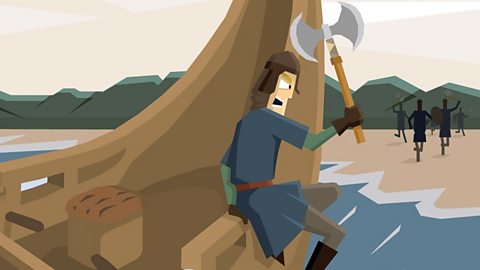
The first Viking raid recorded in the Anglo-Saxon Chronicle was around AD787.
It was the start of a fierce struggle between the Anglo-Saxons and the Vikings.
The Vikings were pagans, not Christians like most people living in Britain at the time.
Christian monasteries in Britain were easy targets for the Vikings.

Watch: Viking attack at Lindisfarne
In AD793 the Vikings famously attacked a monastery at Lindisfarne in Northumbria, north-east England
Over a 1,000 years ago, on the 8 of June AD793, a small band of Vikings sailed down theeastern coast of England.
Their target was a monastery called Lindisfarne, and they decided to launch a surprise attack.It's likely that the first thing the monks saw was the outline of two or three ships on the horizon, butthat would hardly have been unusual.
Living here, they would have been accustomed to the arrival of ships from all sorts of places.Maybe a few of the monks came down onto the beach to welcome the newcomers, with openarms.
But the monks weren't prepared for visitors like these… because these were Viking warriors.And they had come to kill the monks and steal the monastery's treasure.
Life in England was about to change forever, because the savage attack on Lindisfarne was justthe beginning.
50 years after the attack on the Lindisfarne monastery, a huge force of around 3,000Vikings arrived on our shores, and they wanted to conquer the whole of England.
This was truly a force to be reckoned with. The Anglo-Saxons called it the Great HeathenArmy, and it wasn't just a raiding party intent on slaves and gold.
The Great Heathen Army wanted everything, and to get it, they would have to take on the AngloSaxons.
What was the Viking invasion?
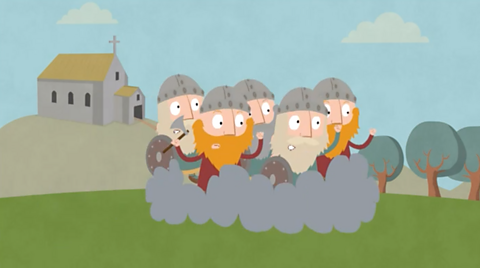
In AD865 a Viking army sailed across the North Sea.
This time they wanted to conquer land rather than just raid it.
Over several years the army battled through Northern England.
By AD878, almost all the kingdoms had fallen to the Vikings. All except for Wessex, which was ruled by Alfred the Great.

Where did the Vikings settle?
- Most Vikings settled in the Danelaw, to the north and east of England.
- Some sailed to Scotland, and on the Shetland and Orkney Islands.
- Vikings also settled on the Isle of Man and often raided Wales, but few made homes there. In Ireland, the Vikings founded the city of Dublin.
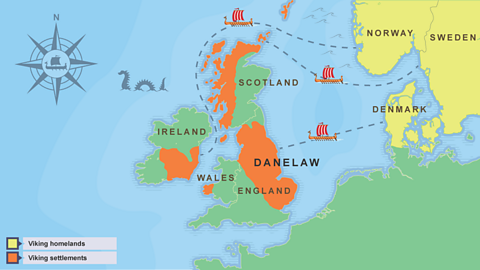
What was life like in the Danelaw territories?
The Danelaw covered three main areas:
- Northumbria (which included modern-day Yorkshire)
- East Anglia
- The Five Boroughs (also known as a town: they were Leicester, Nottingham, Derby, Stamford and Lincoln)
The most important city was York. The Vikings called it Jorvik (pronounced 'your-vick').
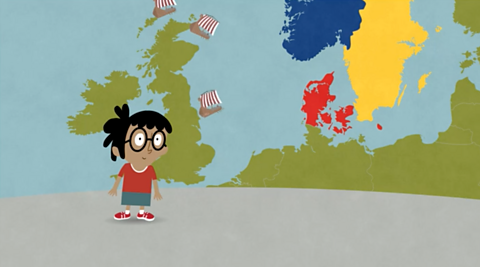
Activity: Quiz – Who were the Vikings?
Bitesize Primary games. gameBitesize Primary games
Play fun and educational primary games in science, maths, English, history, geography, art, computing and modern languages.

More on Vikings
Find out more by working through a topic
- count8 of 10
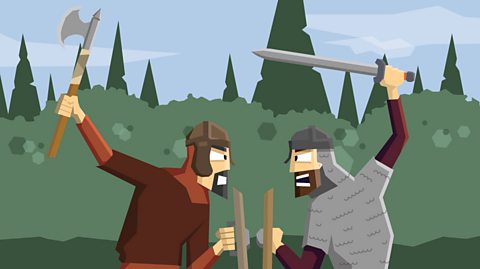
- count9 of 10
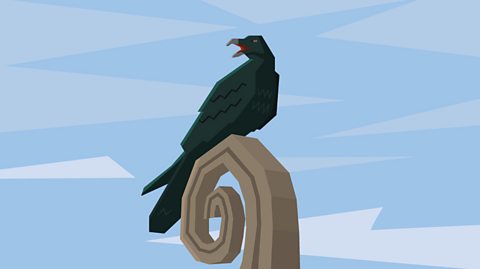
- count1 of 10
